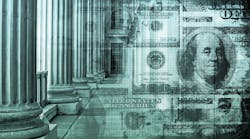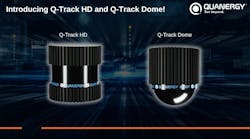Go to a NASCAR race, and you'll be face-to-face with Ingersoll-Rand.
You probably won't be aware of it, but the Woodcliff Lake-based industrial giant will have a major behind-the-scenes presence there, providing security everywhere, from the pits to the stands and the parking lots.
It's all part of a four-year deal I-R's securities technologies division recently signed with the National Association of Stock Car Auto Racing, the sanctioning body for the rapidly growing motor sport.
I-R is no stranger to auto racing, with virtually every pit crew using its air guns to change tires. And the company got involved in the competition this year as a sponsor of the No. 98 Dodge Charger on NASCAR's Busch circuit.
But that's nothing compared with the challenge of providing security at more than 1,500 events at more than 100 tracks in the United States, Canada and Mexico.
"It's a huge responsibility," said Tim Christine, a former Secret Service office who is NASCAR's director of security.
"Our events are among the most attended anywhere, with 17 of the 20 most attended sports venues anywhere," he said. "On any given weekend, we might have 150,000 spectators in the grandstand."
With crowds of that size, as well as hundreds of support and service personnel around the track, it is critical to have plans in place to keep everyone safe and secure and to be prepared for any contingencies, Christine said.
"We live in a post-9/11 society, and with any large-scale public gatherings of any sport there are safeguards built in," he said. That includes solid perimeters, controlling access to different areas around the track and "screening 100 percent of all items coming into that grandstand so that nothing is introduced that shouldn't be introduced."
I-R's Security Technologies division includes mechanical and electronic security products, biometric and access-control technologies and security and scheduling software. Almost all of them will be used on behalf of NASCAR.
"It presents a unique challenge," said David Sylvester, I-R's president of securities technologies for the Americas. "NASCAR has very large venues with multiple pieces."
Security starts with the basic hardware - steel doors and frames - and includes closed-circuit surveillance cameras for the entire facility, from the outer parking lots to the sometimes chaotic infield; electronic access and biometric systems; and time and attendance monitoring of employees, he said.
"There are safeguards built in for any large-scale public gathering of any sport," Christine said. That includes contingency plans, whether for a natural disaster, such as tornadoes, or a terrorist attack.
"We have to be prepared at any given time to evacuate, and that calls for having well-rehearsed plans," he said.
In addition, I-R is now responsible, in conjunction with security managers at individual airports, for security of NASCAR's fleet of corporate jets based in Florida, North Carolina and California.
For security reasons, NASCAR won't divulge specifics, "but each facility that is awarded a NASCAR event has to comply with NASCAR's minimum security requirements," he said.
In developing programs, I-R and NASCAR work with the Department of Homeland Security and the Secret Service, as well as local, state and federal authorities.
"The FBI plays a major role in providing us with intelligence estimates," he said. With live television broadcast of races carried in 150 countries in 30 languages, the tracks, as well as other high-profile sports facilities, have to be ready.
There has been "no specific intelligence directed at us," he said. "But post-9/11, all professional sports leagues can be viewed as soft targets by extremist organizations."
I-R also provides security at other venues, including Shea Stadium in New York, but there are big differences between auto races and other sports events, Christine said.
For one thing, each of the tracks is used for just one or two NASCAR races a year, compared with 81 home dates for a baseball field and eight to 10 for a football stadium. But NASCAR stages races throughout the country over a nine-month span.
Also, while a typical ballgame might last three to four hours, a NASCAR event runs three to four days, and that presents unique security issues, he said.
I-R got into the security business with its 1974 purchase of the Schlage Lock Co., and it has been expanding through organic growth and strategic acquisitions.
Most recently, it closed on its acquisition of an 80 percent share of Shenzhen Bocom System Engineering Co. Ltd., a China-based provider of security-systems integration technologies and services.
"Since 9/11, it has been one of the faster-growing pieces of the company," Sylvester said. "Some people thought there would be an immediate boom. That has not happened, but it's been a steady gain."
In the fourth quarter, revenues for the security division were up 22 percent from a year earlier to $557.6 million. That brought total revenues to almost $2.1 billion, about one-fifth of Ingersoll's total for the year.


